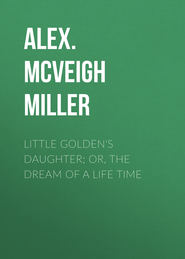По всем вопросам обращайтесь на: info@litportal.ru
(©) 2003-2024.
✖
Little Nobody
Настройки чтения
Размер шрифта
Высота строк
Поля
"Monsieur Van Zandt, you bewilder my little savage. She can not read."
But a light of comprehension flashed instantly into the puzzled eyes. She pulled Eliot's sleeve.
"You mean books. Come, you will find plenty in the library."
He followed her into the pretty room beyond the olive satin portière, where they found plenty of books indeed. She pointed to them, and looked at him helplessly.
He found Webster on the top shelf of a rich inlaid book-case, and was half-stifled with dust as he drew it down from the spot where it had rested undisturbed for years. He sneezed vigorously, and his companion hastened to dust it off with her tiny handkerchief.
"Now!" she said, anxiously, spreading the big book open on a table before him.
CHAPTER III
The leaves fluttered with her hasty movement, and a folded sheet of parchment fell out upon the floor. As he turned the pages to the F's she picked up the paper and held it in her hands, looking curiously at the bold, clear superscription on the back, and the big red seal; but it told nothing to her uneducated eyes, and with an unconscious sigh, she pushed it back into the dictionary, her hand touching his in the movement and sending an odd thrill of pleasure along his nerves.
He read aloud, in his clear, full tones:
"'Friend.—One who, entertaining for another sentiments of esteem, respect, and affection, from personal predilection, seeks his society and welfare; a well-wisher, an intimate associate.'"
She stood by him, her hands resting on the table, trembling with pleasure, her face glowing.
"It is beautiful," she exclaimed. "I thought the word sounded very sweet. And—you—you want to be my friend?"
The most finished coquette might have envied the artless naïveté of her look and tone, yet she was
"Too innocent for coquetry,
Too fond for idle scorning."
Touched by this new side of her character, he put his hand impulsively on the little one resting close by his on the table with a gentle pressure.
"Child, I will be your friend if you will let me," he said, in a gentle tone, and not dreaming of all to which that promise was swiftly leading.
"I shall be so glad," she said, in a voice so humble, and with so tender a face, that the people in the other room would scarce have recognized her as the little savage and vixen they called her.
But Pierre Carmontelle, always full of mischief and banter, had deliberately sauntered in, and heard the compact of friendship between the two who, until to-night, had been utter strangers. He gave his friend a quizzical smile.
"Ever heard of Moore's 'Temple to Friendship,' Van Zandt?" he inquired, dryly. "Let me recall it to your mind."
He brought a book from a stand near by, opened it, and read aloud, with dry significance, in his clear voice:
"'A Temple to Friendship,' said Laura, enchanted,
'I'll build in this garden—the thought is divine!'
Her temple was built, and she now only wanted
An image of Friendship to place on the shrine.
She flew to a sculptor who sat down before her
A Friendship the fairest his art could invent;
But so cold and so dull that the youthful adorer
Saw plainly this was not the idol she meant.
"'Oh, never!' she cried, 'could I think of enshrining
An image whose looks are so joyless and dim;
But you, little god, upon roses reclining,
We'll make, if you please sir, a Friendship of him.'
So the bargain was struck; with the little god laden,
She joyfully flew to her shrine in the grove;
'Farewell,' said the sculptor, 'you're not the first maiden
Who came but for Friendship and took away Love!'"
He shut the book and laughed, for he had the satisfaction of seeing a warm flush mount to the temples of the young journalist, but the girl, so young, so ignorant, so strangely beautiful, looked at him unabashed. Evidently she knew no more of love than she did of friendship. They were alike meaningless terms to her uncultured mind. Frowning impatiently, she said:
"Carmontelle, why did you intrude upon us here? I wanted to talk to Monsieur Van Zandt."
"And I, ma'amselle, wanted to talk to you. Madame Lorraine was very angry with you for racing Selim to-day. What did she do to you?"
The large eyes brightened angrily, and a hot rose-flush broke through the creamy pallor of her oval cheek.
"Beat me!" she said, bitterly.
"No!" from both men in a shocked tone.
"But yes," she replied, with a sudden return of sullenness. With a swift movement she drew the mass of hair from her white shoulders, which she pushed up out of her low dress with a childish movement.
"Look at the marks on my back," she said.
They did look, and shuddered at the sight. The thick tresses of hair had hidden the long, livid marks of a cruel lash on the white flesh. There were a dozen or so of stripes, and the flesh was cut in some places till the blood had oozed through.
The girl's eyes flashed, and she clinched her little hands tightly.
"I hate that woman!" she muttered, fiercely. "Oh, it is cruel, cruel, to be nobody, to have no one but her, to be nothing but a pretty plaything, as she calls me, like her Spitz and her cat, her parrot and monkey! I mean to run away. It was for that I rode to-day—to win the gold—but—"
"But—what?" said Van Zandt, huskily.
She answered with passionate pride:
"When she beat me—when she flung my poverty in my face—when she said I should be starving but for her bread—I flung the purse of gold down at her feet—to—to—pay!"
The hard glitter of the dark eyes dissolved in quick tears. She dropped the golden tresses back on her lacerated shoulders, flung her arms before her face, and hard, choking sobs shook the slight, young form. The two men gazed on her, pale, moved, speechless.
Eliot Van Zandt thought of his fair, young sisters, scarcely older than this girl, on whose lovely frames the winds of heaven were scarce permitted to blow roughly. Why, if any one had struck Maud or Edith such a blow, he should have sent a bullet through his heart, so fierce would be his anger.
He looked at Carmontelle.
"Monsieur Lorraine—does he permit this?" he asked, indignantly.
"Lorraine had been in a mad-house fourteen years—sent there by the madness of jealousy," was the unexpected reply.
Madame's gay, shrill laugh rang out from the salon where she was winning golden eagles from her friends. The journalist shuddered and wondered if the brilliant woman ever remembered the man gone insane for her sake.
Ma'amselle's hard, bitter sobs ceased suddenly as they had begun. She dashed the tears from her eyes, and said, with bitter resignation:
But a light of comprehension flashed instantly into the puzzled eyes. She pulled Eliot's sleeve.
"You mean books. Come, you will find plenty in the library."
He followed her into the pretty room beyond the olive satin portière, where they found plenty of books indeed. She pointed to them, and looked at him helplessly.
He found Webster on the top shelf of a rich inlaid book-case, and was half-stifled with dust as he drew it down from the spot where it had rested undisturbed for years. He sneezed vigorously, and his companion hastened to dust it off with her tiny handkerchief.
"Now!" she said, anxiously, spreading the big book open on a table before him.
CHAPTER III
The leaves fluttered with her hasty movement, and a folded sheet of parchment fell out upon the floor. As he turned the pages to the F's she picked up the paper and held it in her hands, looking curiously at the bold, clear superscription on the back, and the big red seal; but it told nothing to her uneducated eyes, and with an unconscious sigh, she pushed it back into the dictionary, her hand touching his in the movement and sending an odd thrill of pleasure along his nerves.
He read aloud, in his clear, full tones:
"'Friend.—One who, entertaining for another sentiments of esteem, respect, and affection, from personal predilection, seeks his society and welfare; a well-wisher, an intimate associate.'"
She stood by him, her hands resting on the table, trembling with pleasure, her face glowing.
"It is beautiful," she exclaimed. "I thought the word sounded very sweet. And—you—you want to be my friend?"
The most finished coquette might have envied the artless naïveté of her look and tone, yet she was
"Too innocent for coquetry,
Too fond for idle scorning."
Touched by this new side of her character, he put his hand impulsively on the little one resting close by his on the table with a gentle pressure.
"Child, I will be your friend if you will let me," he said, in a gentle tone, and not dreaming of all to which that promise was swiftly leading.
"I shall be so glad," she said, in a voice so humble, and with so tender a face, that the people in the other room would scarce have recognized her as the little savage and vixen they called her.
But Pierre Carmontelle, always full of mischief and banter, had deliberately sauntered in, and heard the compact of friendship between the two who, until to-night, had been utter strangers. He gave his friend a quizzical smile.
"Ever heard of Moore's 'Temple to Friendship,' Van Zandt?" he inquired, dryly. "Let me recall it to your mind."
He brought a book from a stand near by, opened it, and read aloud, with dry significance, in his clear voice:
"'A Temple to Friendship,' said Laura, enchanted,
'I'll build in this garden—the thought is divine!'
Her temple was built, and she now only wanted
An image of Friendship to place on the shrine.
She flew to a sculptor who sat down before her
A Friendship the fairest his art could invent;
But so cold and so dull that the youthful adorer
Saw plainly this was not the idol she meant.
"'Oh, never!' she cried, 'could I think of enshrining
An image whose looks are so joyless and dim;
But you, little god, upon roses reclining,
We'll make, if you please sir, a Friendship of him.'
So the bargain was struck; with the little god laden,
She joyfully flew to her shrine in the grove;
'Farewell,' said the sculptor, 'you're not the first maiden
Who came but for Friendship and took away Love!'"
He shut the book and laughed, for he had the satisfaction of seeing a warm flush mount to the temples of the young journalist, but the girl, so young, so ignorant, so strangely beautiful, looked at him unabashed. Evidently she knew no more of love than she did of friendship. They were alike meaningless terms to her uncultured mind. Frowning impatiently, she said:
"Carmontelle, why did you intrude upon us here? I wanted to talk to Monsieur Van Zandt."
"And I, ma'amselle, wanted to talk to you. Madame Lorraine was very angry with you for racing Selim to-day. What did she do to you?"
The large eyes brightened angrily, and a hot rose-flush broke through the creamy pallor of her oval cheek.
"Beat me!" she said, bitterly.
"No!" from both men in a shocked tone.
"But yes," she replied, with a sudden return of sullenness. With a swift movement she drew the mass of hair from her white shoulders, which she pushed up out of her low dress with a childish movement.
"Look at the marks on my back," she said.
They did look, and shuddered at the sight. The thick tresses of hair had hidden the long, livid marks of a cruel lash on the white flesh. There were a dozen or so of stripes, and the flesh was cut in some places till the blood had oozed through.
The girl's eyes flashed, and she clinched her little hands tightly.
"I hate that woman!" she muttered, fiercely. "Oh, it is cruel, cruel, to be nobody, to have no one but her, to be nothing but a pretty plaything, as she calls me, like her Spitz and her cat, her parrot and monkey! I mean to run away. It was for that I rode to-day—to win the gold—but—"
"But—what?" said Van Zandt, huskily.
She answered with passionate pride:
"When she beat me—when she flung my poverty in my face—when she said I should be starving but for her bread—I flung the purse of gold down at her feet—to—to—pay!"
The hard glitter of the dark eyes dissolved in quick tears. She dropped the golden tresses back on her lacerated shoulders, flung her arms before her face, and hard, choking sobs shook the slight, young form. The two men gazed on her, pale, moved, speechless.
Eliot Van Zandt thought of his fair, young sisters, scarcely older than this girl, on whose lovely frames the winds of heaven were scarce permitted to blow roughly. Why, if any one had struck Maud or Edith such a blow, he should have sent a bullet through his heart, so fierce would be his anger.
He looked at Carmontelle.
"Monsieur Lorraine—does he permit this?" he asked, indignantly.
"Lorraine had been in a mad-house fourteen years—sent there by the madness of jealousy," was the unexpected reply.
Madame's gay, shrill laugh rang out from the salon where she was winning golden eagles from her friends. The journalist shuddered and wondered if the brilliant woman ever remembered the man gone insane for her sake.
Ma'amselle's hard, bitter sobs ceased suddenly as they had begun. She dashed the tears from her eyes, and said, with bitter resignation:











